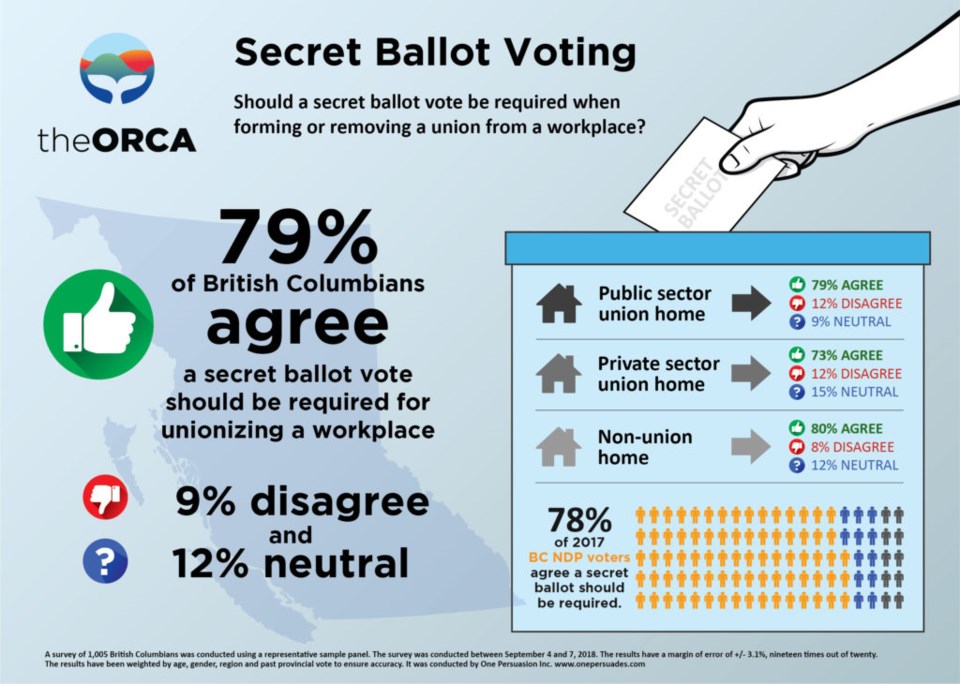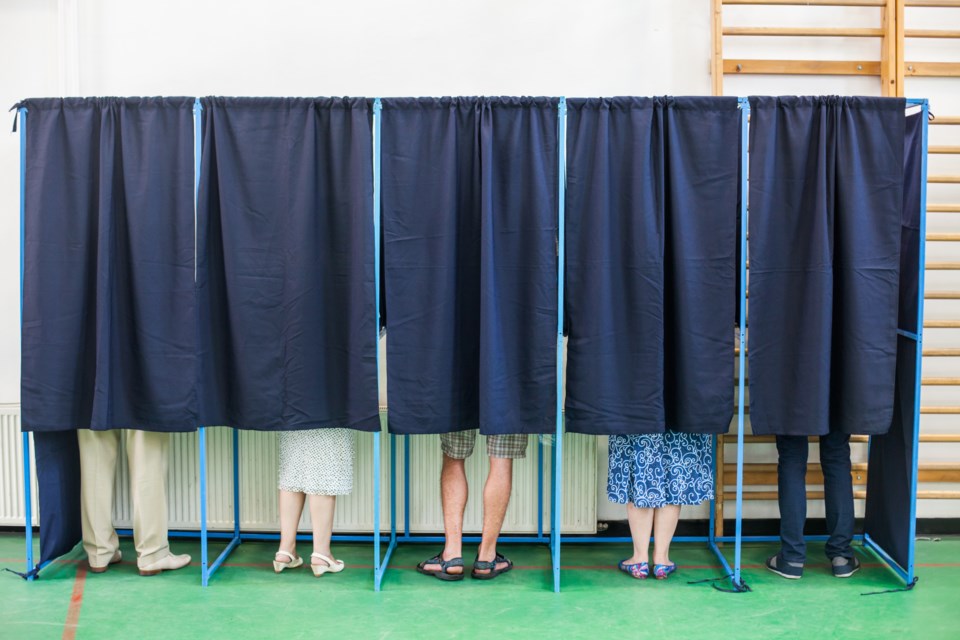According to a poll done exclusively for The Orca, only 9% of British Columbians support getting rid of the secret ballot and returning to card check.
To put that into context, that’s 10 percentage points less than the number of British Columbians who believe 9/11 was a US government conspiracy.

Among those who identified themselves as having voted for the NDP in 2017, 78% support the secret ballot, with 12% wanting card check – a margin of more than 6 to 1, again, among the NDP’s own supporters.
The survey, done on behalf of The Orca by One Persuasion Inc., of 1,005 British Columbians was conducted using a representative sample panel, between Sept. 4 and 7, 2018. The results have a margin of error of +/- 3.1%, nineteen times out of twenty. The results have been weighted by age, gender, region and past provincial vote to ensure accuracy.
Under B.C. law, all certification votes – whether to unionize, change unions, or get out of a union – must be done with a secret ballot, overseen by the Labour Relations Board in a manner similar to Elections BC overseeing provincial votes. B.C. has experience using both systems, using a secret ballot from 1984 to 1993, when the NDP re-introduced card check. In 2001, the new BC Liberal government restored the secret ballot.
Under a card check system, unions are automatically certified if a majority of workers sign union membership cards. With this system, there’s only one vote – signing it is effectively saying “yes, let’s form a union” and refusing is “thanks, but I’m good.” It’s easy to identify who’s on board, and who might benefit from some friendly persuasion.
A quick pause here: before your imagination runs away, we’re not talking about some cabal of thugs, but ordinary working people. Most of the time, “friendly persuasion” is exactly that – not intimidation, much less threats. It’s more on the order of “unnecessary social awkwardness.”
But occasionally, passions can and do run too high, as was seen recently in Newfoundland with Unifor’s “scab video.” Whatever you think of that particular strike – and the union did have cause to be deeply frustrated – or scab workers in general, some of those workers received death threats.
For their part, NDP leadership and most large unions prefer card check, for the simple (and well-documented) reason that people are more likely to join or form unions.
A 2016 Manning Centre study of more than 1,000 Canadian certification votes found 241 cases where support for unionization dropped by more than five percentage points when secret ballot was used. In 81 votes, support for the union dropped by 15 full percentage points in the secret ballot.
If you don’t trust the Manning Centre (or math), fair enough, but the basic premise – card check means more unionization – isn’t disputed by anyone. It’s easy to understand why scrapping the secret ballot pops up regularly on labour wish lists.
Thus far, Green Party leader Andrew Weaver has been firm in his opposition to card check, even when the NDP reportedly asked for it during negotiations on the Confidence and Supply Agreement.
To recap – British Columbians don’t want card check; NDP voters don’t want card check; the Green Party voters doesn’t want card check. In fact, no region or party has anything less than two-thirds support for the secret ballot.
In fact, even union households don’t want the card check. Fully 79% of people living in public sector union homes and 73% of those in private sector union homes want the secret ballot. That’s not far off the 80% support recorded in non-union homes.
And yet, despite what can only be termed as overwhelming opposition, all signs point to the NDP removing the secret ballot.
John Horgan himself promised card check during the 2017 election campaign. This fall, Labour Minister Harry Bains is expected to release the results of a Labour Relations Code review, including the secret ballot process, and Horgan has already indicated he expects card check to go ahead.
It’s hard to fathom: a razor-thin minority government moving forward with a plan that a crushing majority of British Columbians oppose, including the Green partners they need to stay in power. Whatever Weaver and the Greens do, card check is an almost uniquely unpopular plan – even the HST was vastly more popular – and will likely bring a heavy political cost. So why bother?
Start with the man reviewing the Labour Relations Code. Bains was a member of the Steelworkers-IWA Canada Local 2171 for more than 15 years, including stints as lead negotiator and vice president.
As Tom Fletcher noted after Bains was announced as minister in 2017: “[Bains] came to politics from a career with the Steelworkers-IWA Canada. NDP insiders call it ‘Steel,’ an indication of the intimacy between the party and the international union that bankrolled its campaign staff.”
“Steel” paid the salaries of at least a dozen 2017 NDP campaign operatives and was the single biggest political donor in B.C., giving $1.4 million to the NDP in the lead-up to election day – which was completely legal.
To the NDP’s credit, they held true to their word, and banned large donations.
Repaying past favours, however, is still fair game.



